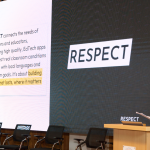February 2, 2020
Driving K-12 innovation
CoSN has published its EdTech Report 2020 which identifies the key hurdles and accelerators for the education technology industry
The Consortium for School Networking (CoSN) is a professional association of EdTech leaders based in Washington, D.C. It recently published a report titled: ‘Driving K-12 innovation: 2020 Hurdles and Accelerators’. The EdTech report 2020 identifies the top 5 hurdles and the top 5 accelerators for the education technology industry. It also delves deeper into two hurdles: Data Privacy and the Evolution of Teaching & Learning, as well as two accelerators: Data Driven Practices and Social Emotional Learning.
A three stage process was followed to select the hurdles and accelerators:
Stage 1: Survey
A survey was distributed to the Advisory Board which consists of approximately 100 educational leaders, researchers, technologists, and change makers.
Stage 2: Discussion
The topics were discussed in an online forum to narrow the list of hurdles and accelerators from stage 1.
Stage 3: Final Survey
The final list of key hurdles and accelerators was determined through a survey.
%
Scaling & Sustaining Innovation
Top 5 Hurdles
1. Scaling and Sustaining Innovation
2. Data Privacy & Ownership
3. Evolution of Teaching and Learning
4. Pedagogy vs. Technology Gap
5. Digital Equity
Top 5 Accelerators
1. Learners as Creators
2. Data-Driven Practices
3. Personalization
4. Social and Emotional Learning
5. Building Human Capacity of Leaders
CoSN is a vendor neutral organisation which aims to support education technology leaders through research, professional development and advocacy. It runs an annual conference which can be accessed here: https://cosnconference.org/
“ I hope you use this resource to spark a conversation about innovation in your school system, and encourage you to share this report with your colleagues. Together, we can drive meaningful innovation in K–12 education—and ensure that students are the ultimate benefactors of technology-enriched learning. ” Victor Rivero, Editor-In-Chief, State of EdTech 2020-2021









